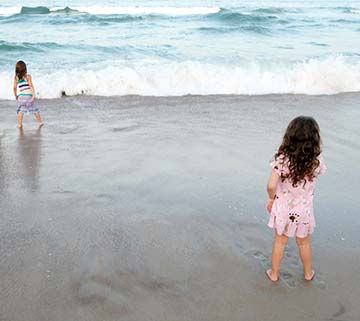A very public grief: how to support an introvert
USA – So imagine how I feel when days after my mother dies I find myself staring down an endless line of black dresses and dark suits; a veritable who’s who of my family’s past, all waiting to do the awkward hug-or-no-hug tango.
Towards the beginning of the line I see the heads start to tilt in sympathy and I imagine people like my high school English teacher and old what’s-his-name from down the street doing neck stretches in the lobby. God I’m such a horrible person, these people are here to support me and all I want to do is find a place to hide. I briefly contemplate the types of places I could find to hide in a funeral home and immediately abandon the thought.
Generally speaking I’ve embraced my introverted nature, but times like these I wish I could be anyone but who I am. I feel stupid and embarrassed, my palms are sweaty and my attitude is horrible. I understand the need for ritual, but forcing grievers to engage in small talk with hundreds of people, now that seems like a form of torture that should be reserved for PTA luncheons and college orientation.
I take solace knowing I’m not alone in my misery; my father, brothers, and sisters all share similar temperaments. They fall differently along the introvert/extrovert continuum, but I know, like me, they would give anything to spend rest of the evening
In Susan Cain’s book Quiet: The Power of Introverts in a World That Can’t Stop Talking, she notes that 1/3-1/2 of Americans fall somewhere on the ‘Introverted’ end of the spectrum. No, this doesn’t mean ½ of all Americans are homebody loners. Introverts are social and have friends just like anyone else, the difference is they are more likely to opt for low key situations such as spending time one-on-one or with small groups of friends, co-workers, and family members.
Grief is hard on everyone, but taking all this into account we see introverts face their own set of challenges after a death. It’s our nightmare, we are on stage and everyone’s watching to see what we do. How are we coping? How are we holding up? At the wake, at the funeral, at the coffee hour afterwards – 100 sets of eyes all fixed on you, waiting for their opportunity to shake your hand and pay their condolences.
After a death, and before in the case of terminal illness, grievers are surrounded by people asking the same questions and offering the same standard platitudes. Grievers are forced to chit chat about everything from the weather to (groan) their feelings. Not wanting to seem ungrateful or impolite, they engage with everyone – on the phone, at the funeral, at work, in the grocery store, on the internet, in their own home. I’m exhausted just thinking about it.
Honestly, I wouldn’t be surprised if it took introverts much longer to get out into the world after a loss, if for no other reason than because they know they will encounter people. When my mother was dying I felt like everywhere I went I was asked for the latest update. I was hesitant to go anywhere for fear of having yet another awkward conversation. I mean why not stay home until (at least) the 3rd degree of separation forgot I was in mourning? My friends knew where to find me and they knew me well enough to pretend nothing was going on.
My very basic advice to introverts dealing with grief is accept your nature and go easy on yourself. You will likely have to endure the rituals associated with the funeral and for a while after the death people are probably going to want to check in, call, drop by, and stop you on the street. Acknowledge these things may be draining for you and plan to give yourself a little extra space and time. Also, don’t be surprised if the coping mechanisms that worked for your extroverted friend, like widow/widower happy hours and support groups, don’t feel as right for you. You may feel more comfortable talking to a friend or family member who’s had similar experiences, connecting with an online community, writing in a journal, or reading things like books or grief blogs.
As for those hoping to support an introvert, I will forever be grateful to those closest to me because they had the foresight to follow my lead. Introverts and extroverts are often good compliments to one another, but they can also have a heck of a hard time understanding each other. We often talk about how people cope differently depending on their loss, temperament, personality, and circumstances; introversion is just one more variable to take into consideration. It stands to reason that introverts may be less interested in having a constant stream of people around for support because they need alone time to recharge, remember? If they do want you around, don’t feel hurt or confused if your introverted friend doesn’t feel like talking. Introverts are often happy being in the quiet presence of someone else, so don’t push it if they don’t open up.
Originally published by What’s your grief?, author Eleanor Haley.


Leave a Comment
You must be logged in to post a comment.